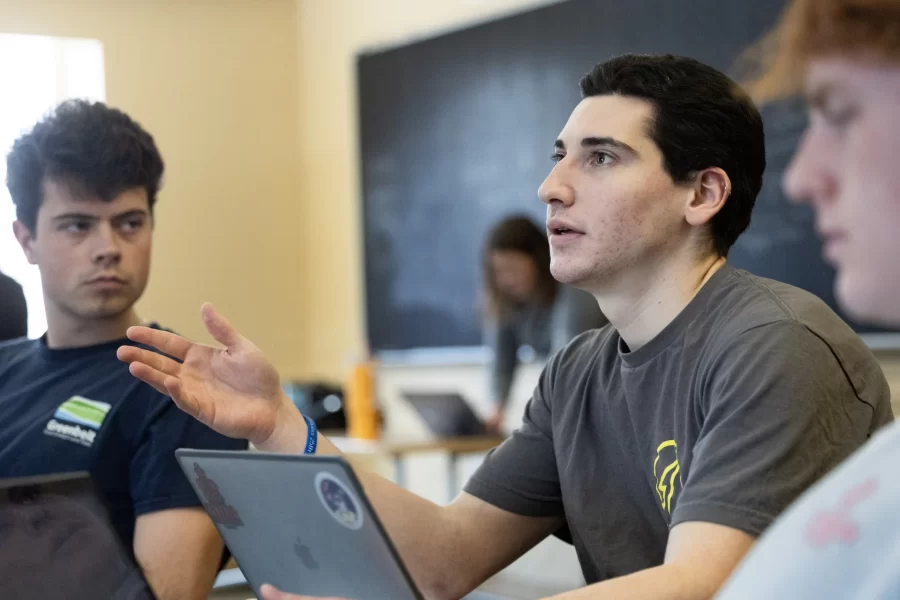The past is everywhere around us, baked into the structures, narratives, and questions that shape our society today. It is neither a single set of details etched in time nor a single account of lives and events now distanced from us.
What is History at Bates
The past is everywhere around us, baked into the structures, narratives, and questions that shape our society today. It is neither a single set of details etched in time nor a single account of lives and events now distanced from us. History as a discipline examines the very constructions of those pasts over time and emphasizes the dynamic means by which we come to understand, construct, and narrate it today.
Engaging in these constructions of the past requires us to identify and reckon with systems of knowledge and relationships of power in their varied contexts in a given location, and across communities, geographies, and across time. Such work requires great care. The past has often been invoked by people who have sought to support systems of oppression. The study of history helps us understand how these systems of domination were created and how they were and are sustained.
Our goal is to bring to the fore viable and ethical narratives about the past. We invite all students to our classes so that they can all, regardless of their embodied identities, recognize themselves as creators of history.
How we structure History classes at Bates
Our overarching goal for History at Bates is that courses are accessible to all students. We recognize that students enter our courses with a range of interests and experiences with the study of history. Few of our courses have prerequisites and none have them at the 100 and 200 levels. As a result, students may take almost any HIST course as their first History course, even though our courses are listed as 100-, 200-, and 300-level classes.
We encourage students to start at the 100 and 200 levels, which provide an entry into the discipline of history. All 100-level HIST courses introduce students to the methods of history. In them, students learn to analyze primary sources, to make arguments and use evidence, to consider how history is constructed, to recognize the importance of context, and to develop curiosity and empathy. Students continue to encounter and hone these approaches at 200- and 300-levels.
In the 301 seminars students think about history as a process and undertake independent research and writing related to the course’s topics. These classes are the department’s [W2] courses and set students up for the 399 Historical Methods class. HIST 399 reflects upon both the major and discipline and prepares students to undertake their own thesis research. Ideally, students take 399 the semester immediately preceding their thesis.
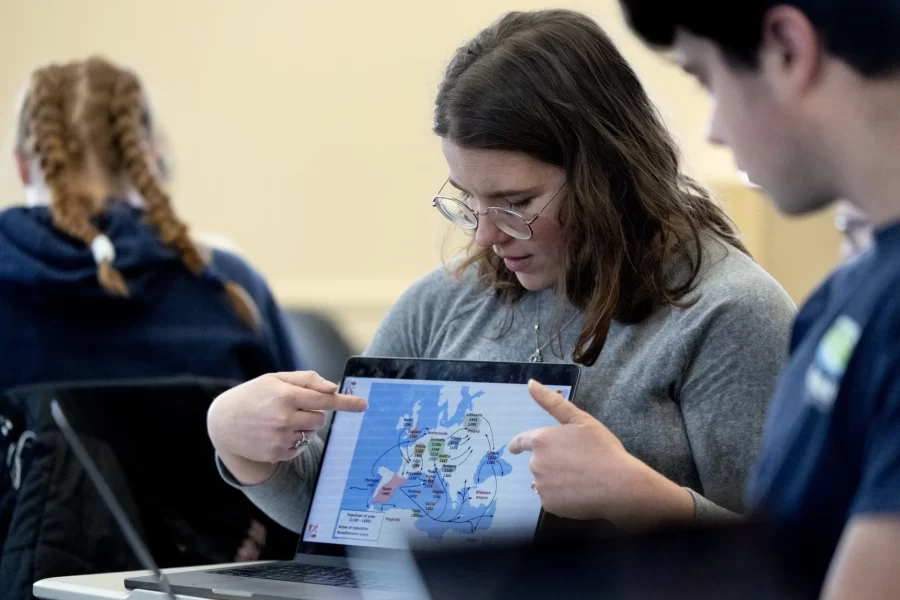
Students in Associate Professor of Hispanic Studies Stephanie Pridgeon’s “Screening Citizenship: Jewish Latin American Film” class prepare for two upcoming presentations they will make at the upcoming
Maine Jewish Film Festival, both in Portland and Bates. One film is called “Torah Tropical” (see below) and the other, made in Argentina and Austria, is called “The Klezmer Project).
Pridgeon says:
This coming Tuesday, March 4 at 7 PM in Olin, we will be screening the beautiful documentary “Torah Tropical” followed by a Q + A with producer Heidi Paster (parent of a current Bates student) led by students from my Jewish Latin American film seminar. The documentary follows the story of a family in Cali, Colombia, who converts to Judaism and attempts to immigrate to Israel. Please join us if you’re interested and please also consider passing along the information to your students, colleagues, and friends if they might also be interested (entry is free for Bates staff, faculty, and students!)
This course considers films from throughout Latin America made by Jewish directors. Students learn the history of Latin American film production as well as terms and skills necessary for audiovisual analysis. The course examines the ways in which film is used as a vehicle to explore and represent issues of identity, belonging, immigration, and assimilation that have long characterized Jewish experiences in Latin America. Moreover, the course focuses on filmmakers’ engagement with key social and political issues within their respective countries as well as on a regional or global scale. Taught in Spanish. Recommended background: HISP 228. Prerequisite(s): HISP 210 or 211.
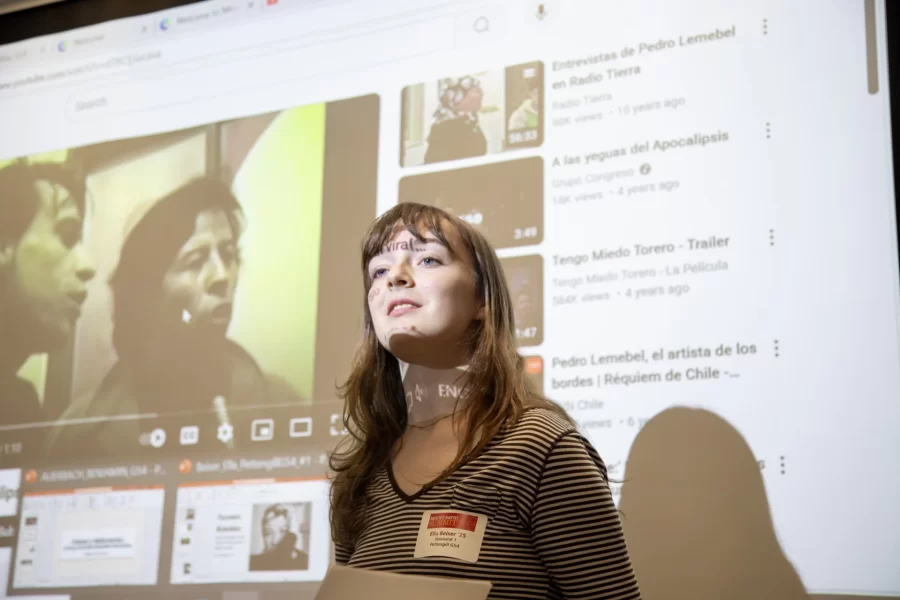
Ella Beiser ’25 presents her Hispanic Studies thesis on the work of queer Chilean activist Pedro Lemebel during the Hispanic Studies Panel.
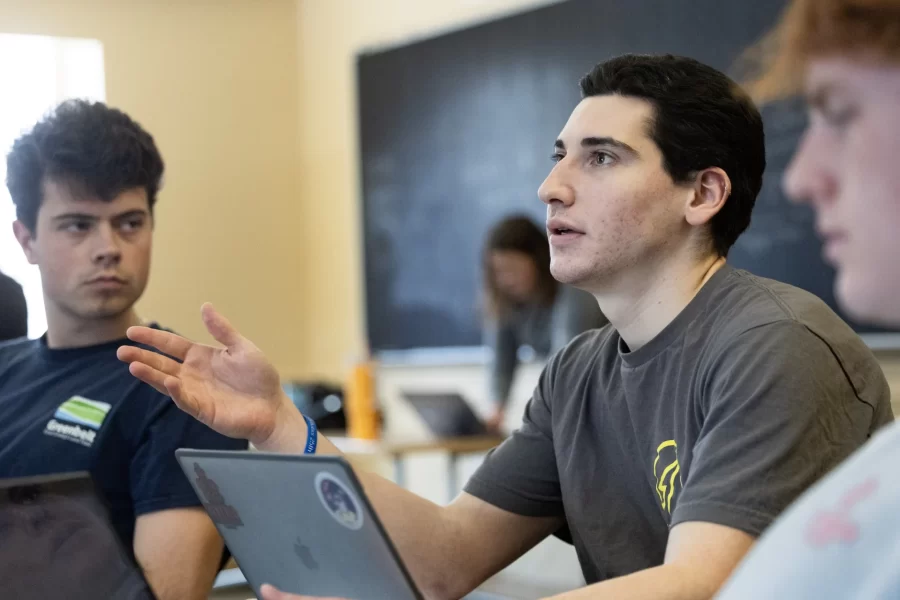
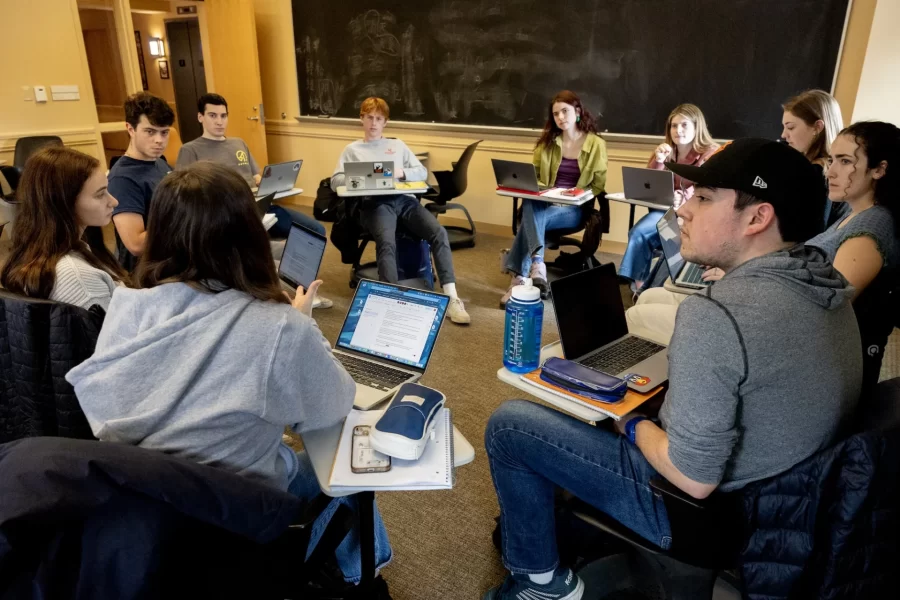
Students in Associate Professor of Hispanic Studies Stephanie Pridgeon’s “Screening Citizenship: Jewish Latin American Film” class prepare for two upcoming presentations they will make at the upcoming
Maine Jewish Film Festival, both in Portland and Bates. One film is called “Torah Tropical” (see below) and the other, made in Argentina and Austria, is called “The Klezmer Project).
Pridgeon says:
This coming Tuesday, March 4 at 7 PM in Olin, we will be screening the beautiful documentary “Torah Tropical” followed by a Q + A with producer Heidi Paster (parent of a current Bates student) led by students from my Jewish Latin American film seminar. The documentary follows the story of a family in Cali, Colombia, who converts to Judaism and attempts to immigrate to Israel. Please join us if you’re interested and please also consider passing along the information to your students, colleagues, and friends if they might also be interested (entry is free for Bates staff, faculty, and students!)
This course considers films from throughout Latin America made by Jewish directors. Students learn the history of Latin American film production as well as terms and skills necessary for audiovisual analysis. The course examines the ways in which film is used as a vehicle to explore and represent issues of identity, belonging, immigration, and assimilation that have long characterized Jewish experiences in Latin America. Moreover, the course focuses on filmmakers’ engagement with key social and political issues within their respective countries as well as on a regional or global scale. Taught in Spanish. Recommended background: HISP 228. Prerequisite(s): HISP 210 or 211.
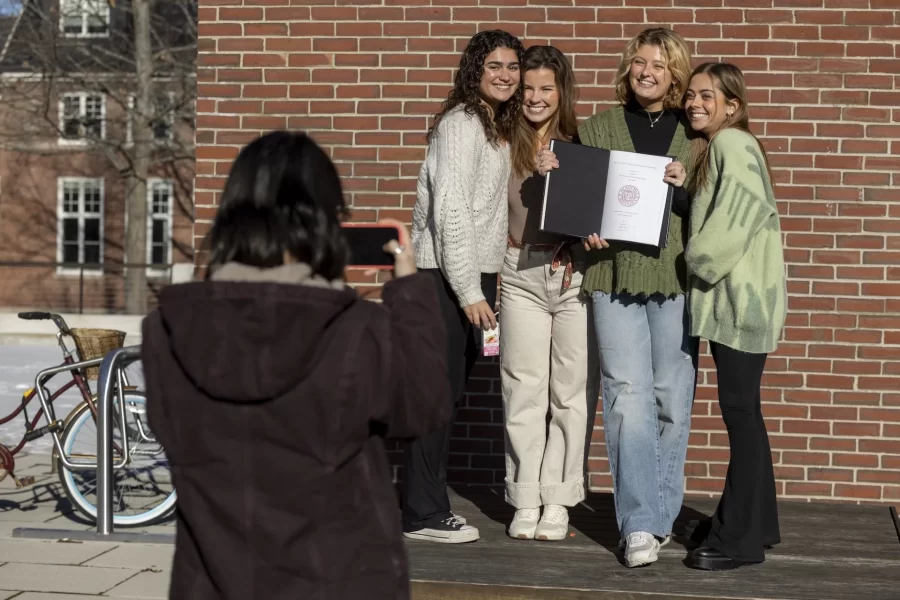
Ilana Rosker ’23 of Lexington,Mass.,(hat), a major in Hispanic Studies, and Emma Pike ’23 of York, Maine, a major in Hispanic studies, bind their theses in the company of friends on the Library Terrace on Dec. 13, 2022.
Rosker wrote on “La imagination, la rapture y la magia: Hacienda espacio para la conciencia alternativa a traves de la poesia Latin X.”
Pike wrote on “Llimpia bus propoios Platos!: explorando masculinidad hegemonica en Jane the Virgin.”
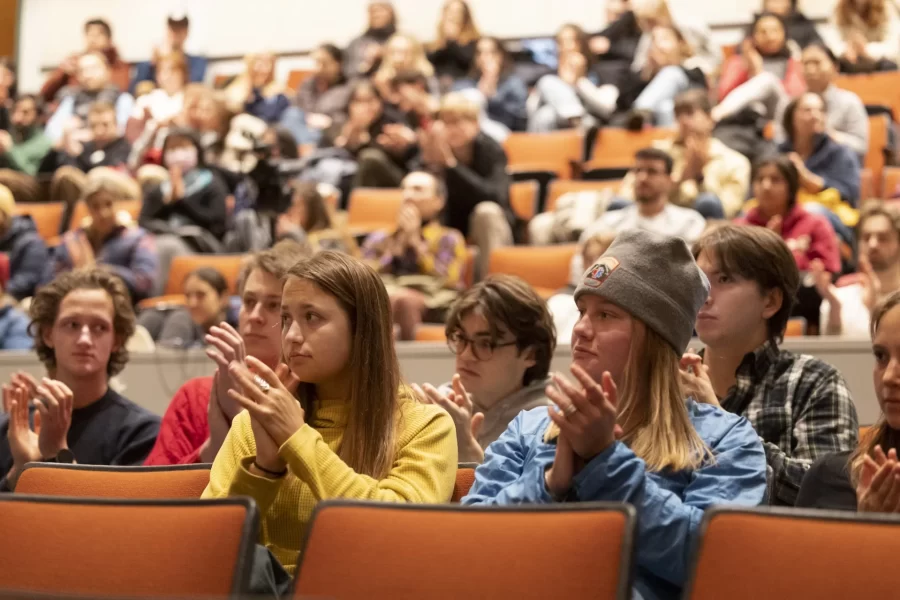
2pm | All These Sons
Screening and discussion. Chicago’s West and South sides are infamous for their high murder rates. In this documentary directed by Bing Liu and Joshua Altman, Marshall Hatch Jr. ’10 and Billy Moore (who served 20 years in prison for murder) create healing spaces for young men to reimagine themselves, find redemption, and embrace causes worth fighting for. Hatch, the subject of a cover story by Bates Magazine in 2021, will introduce the film. (2021; 88 min.) Sponsored by the Program in American Studies, Department of Anthropology, Department of Hispanic Studies, and Department of Rhetoric, Film, and Screen Studies.
Location: Olin Concert Hall
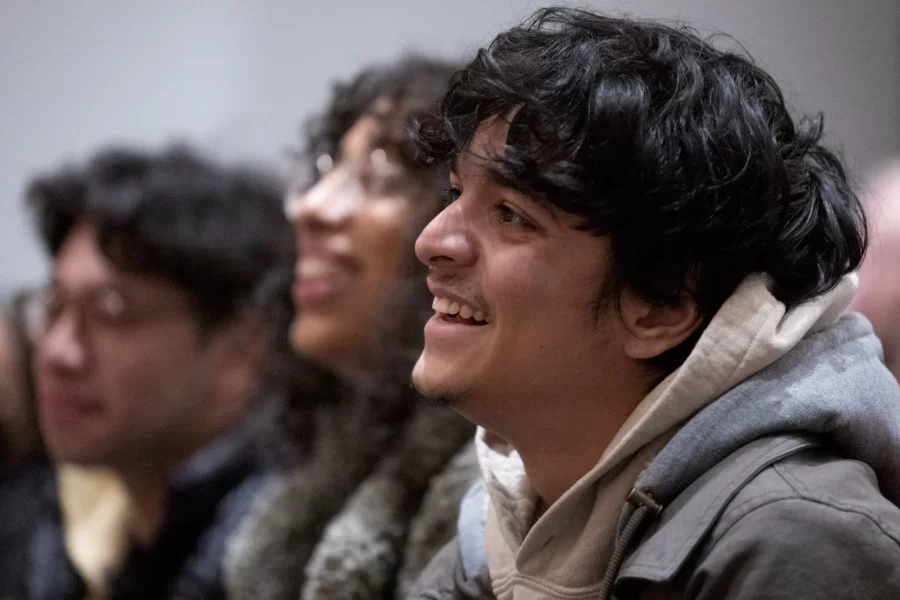
2pm | All These Sons
Screening and discussion. Chicago’s West and South sides are infamous for their high murder rates. In this documentary directed by Bing Liu and Joshua Altman, Marshall Hatch Jr. ’10 and Billy Moore (who served 20 years in prison for murder) create healing spaces for young men to reimagine themselves, find redemption, and embrace causes worth fighting for. Hatch, the subject of a cover story by Bates Magazine in 2021, will introduce the film. (2021; 88 min.) Sponsored by the Program in American Studies, Department of Anthropology, Department of Hispanic Studies, and Department of Rhetoric, Film, and Screen Studies.
Location: Olin Concert Hall
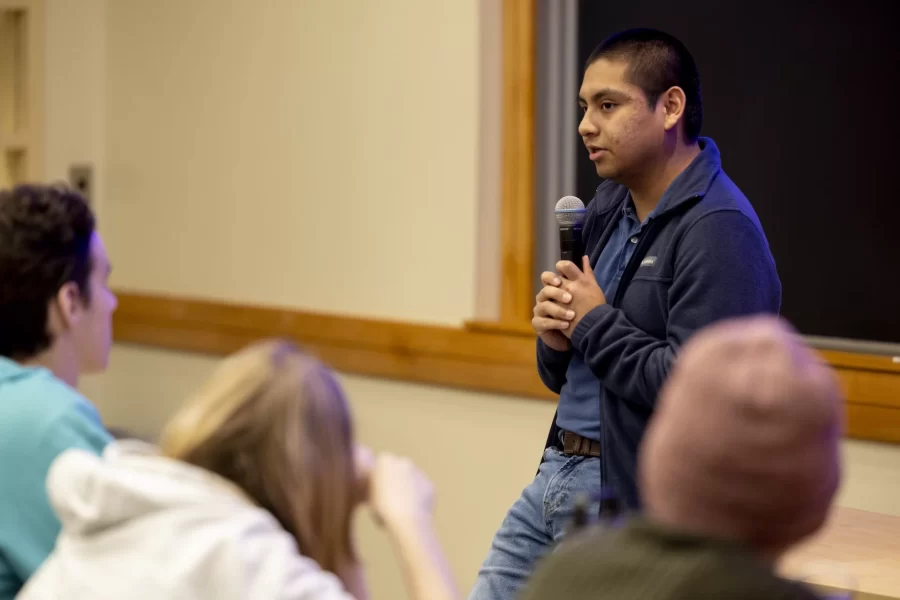
The Right to Live with One’s Parents vs U.S. Immigration Policy of Family Separation
Screening and discussion. U.S. immigration policies enforce family separation. Several million U.S. citizen children have at least one undocumented parent and are part of mixed-status families. Even though they are entitled to the same rights and freedoms as all Americans, many of these children are growing up with the constant fear of separation from their parents. The workshop features a showing of Abrazos (Embraces), a film by Guatemalan director Luis Argueta, about the experience of 14 U.S. citizen children, sons and daughters of unauthorized immigrants in this country, who travel from Minnesota to Guatemala to meet their grandparents, and in some cases, their siblings, for the first time. Luis Argueta will answer questions at the end. Led by: Baltasar Fra-Molinero, Professor of Hispanic Studies.
Location: Pettengill G65 |
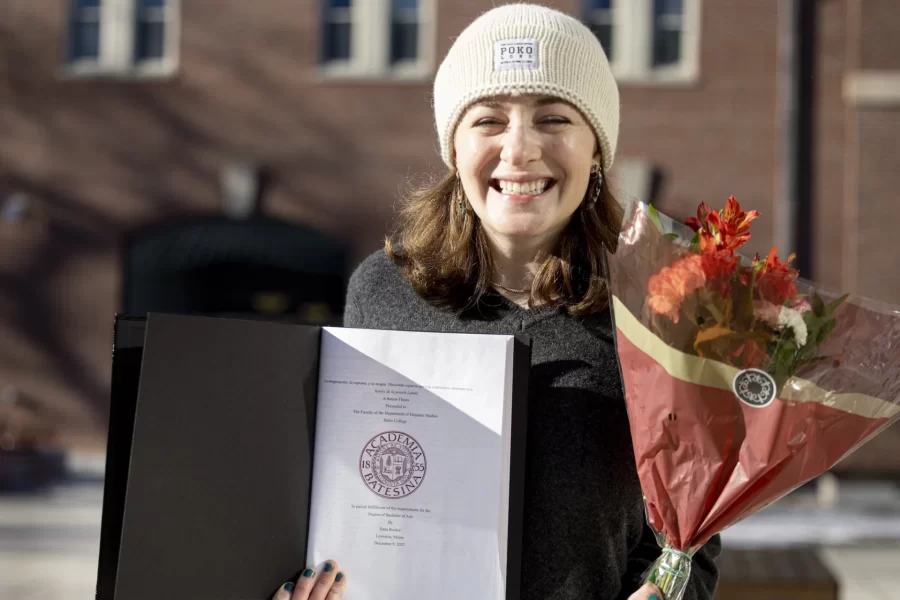
Ilana Rosker ’23 of Lexington,Mass.,(hat), a major in Hispanic Studies, and Emma Pike ’23 of York, Maine, a major in Hispanic studies, bind their theses in the company of friends on the Library Terrace on Dec. 13, 2022.
Rosker wrote on “La imagination, la rapture y la magia: Hacienda espacio para la conciencia alternativa a traves de la poesia Latin X.”
Pike wrote on “Llimpia bus propoios Platos!: explorando masculinidad hegemonica en Jane the Virgin.”
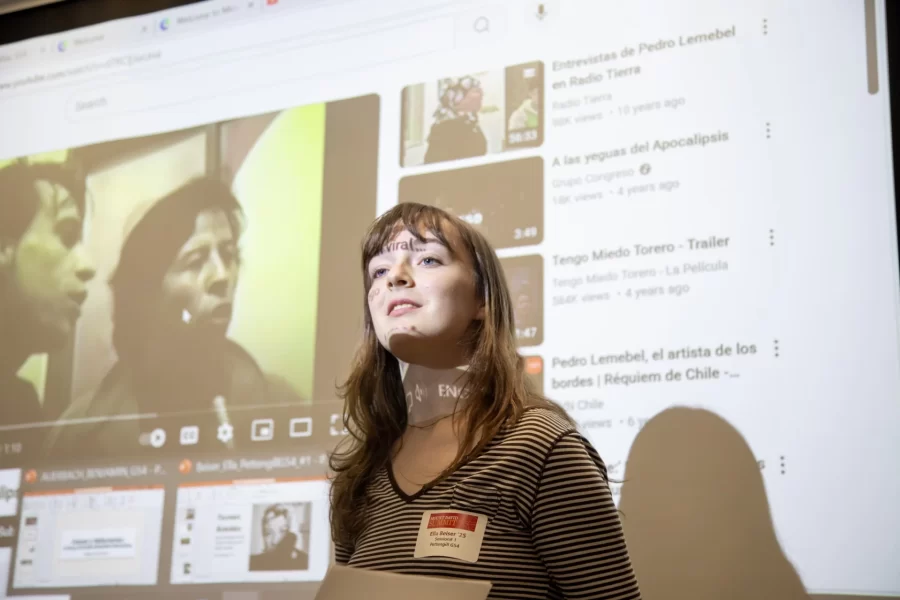
Ella Beiser ’25 presents her Hispanic Studies thesis on the work of queer Chilean activist Pedro Lemebel during the Hispanic Studies Panel.









